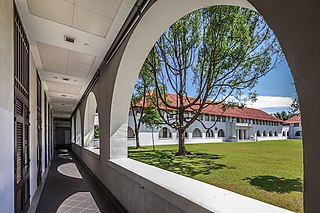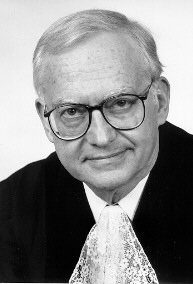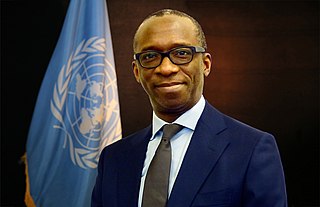
A tribunal, generally, is any person or institution with authority to judge, adjudicate on, or determine claims or disputes—whether or not it is called a tribunal in its title. For example, an advocate who appears before a court with a single judge could describe that judge as "their tribunal." Many governmental bodies are titled "tribunals" to emphasize that they are not courts of normal jurisdiction. For example, the International Criminal Tribunal for Rwanda was a body specially constituted under international law; in Great Britain, employment tribunals are bodies set up to hear specific employment disputes. In many cases, the word tribunal implies a judicial body with a lesser degree of formality than a court, in which the normal rules of evidence and procedure may not apply, and whose presiding officers are frequently neither judges nor magistrates. Private judicial bodies are also often styled "tribunals." The word tribunal, however, is not conclusive of a body's function—for example, in Great Britain, the Employment Appeal Tribunal is a superior court of record.
The International Centre for Settlement of Investment Disputes (ICSID) is an international arbitration institution established in 1966 for legal dispute resolution and conciliation between international investors and States. ICSID is part of and funded by the World Bank Group, headquartered in Washington, D.C., in the United States. It is an autonomous, multilateral specialized institution to encourage international flow of investment and mitigate non-commercial risks by a treaty drafted by the International Bank for Reconstruction and Development's executive directors and signed by member countries. As of May 2016, 153 contracting member states agreed to enforce and uphold arbitral awards in accordance with the ICSID Convention.

The National University of Singapore Faculty of Law is Singapore's oldest law school. NUS Law was initially established in 1956 as the Department of Law in the University of Malaya. After its establishment, NUS Law was Singapore's only law school for half a century, until the subsequent establishment of the SMU School of Law in 2007 and the SUSS School of Law in 2017. NUS Law is currently located at the NUS Bukit Timah Campus. The current dean of NUS Law is Andrew Simester. Internationally, NUS Law has been ranked twelfth by the QS World University Rankings by Subject in 2023 and eleventh by the Times Higher Education World University Rankings by Subject in 2024.

Francis K. Butagira is a Ugandan lawyer, judge, politician and retired diplomat, who serves as the chairman of the Uganda Registration Services Bureau (URSB), an agency of the Ugandan government responsible for maintaining registration data. He was appointed to that position in October 2015. He concurrently serves as the Managing Partner of Butagira and Company Advocates, a Kampala-based legal practice.
George W. Kanyeihamba is a Ugandan author, a retired supreme court Judge, former cabinet minister, member of parliament and was a chair of the Legal Committee of the Constituent Assembly that made the 1995 Constitution. He was appointed a member of the Supreme Court of Uganda in 1997 and retired in November 2009. Previously, he served as minister of commerce, minister of justice, and attorney-general, all in President Yoweri Museveni's administration. He holds a Ph.D. in law from the University of Warwick. In 2008, Warwick awarded him an honorary LLD.

Stephen Myron Schwebel, is an American jurist and international judge, counsel and arbitrator. He previously served as judge of the World Bank Administrative Tribunal (2010–2017), as a member of the U.S. National Group at the Permanent Court of Arbitration, as president of the International Monetary Fund Administrative Tribunal (1993–2010), as president of the International Court of Justice (1997–2000), as vice president of the International Court of Justice (1994–1997), and as Judge of the International Court of Justice (1981–2000). Prior to his tenure on the ICJ, Schwebel served as deputy legal adviser to the U.S. Department of State (1974–1981) and as assistant legal adviser to the U.S. Department of State (1961–1967). He also served as a professor of law at Harvard Law School (1959–1961) and Johns Hopkins University (1967–1981). Schwebel is noted for his expansive opinions in momentous cases such as Legality of the Threat or Use of Nuclear Weapons, Military and Paramilitary Activities in and Against Nicaragua and Oil Platforms .

Wayne State University Law School is the law school of Wayne State University in Detroit. Wayne Law is located in Midtown, Detroit's Cultural Center. Founded in 1927, the law school offers juris doctor (J.D.), master of laws (LL.M.), online master of studies in law, and minors in law degree programs.

The University of Missouri School of Law is the law school of the University of Missouri. It is located on the university's main campus in Columbia, forty minutes from the Missouri State Capitol in Jefferson City. The school was founded in 1872 by the Curators of the University of Missouri. Its alumni include governors, legislators, judges, attorneys general, and law professors across the country. According to Mizzou Law's 2016 ABA-required disclosures, 82 percent of the 2016 class obtained full-time, long-term, JD-required employment nine months after graduation.
Justice James Ogoola is the former Principal Judge of the High Court of Uganda and a Justice of the COMESA Court of Justice in Lusaka, Zambia. He is the also the former chairperson of the Judicial Service Commission of Uganda. Previously, he served as the chairman of the commission of inquiry into the mismanagement of The Global Fund to Fight AIDS, Tuberculosis and Malaria. He was an Acting Justice of the Supreme Court of Uganda. He is a member of The East African Court of Justice.
Benjamin Josses Odoki was the tenth Chief Justice of Uganda from 2001 to 2013.

The Law Development Centre (LDC) is an educational institution in Uganda for higher learning that offers various legal courses ranging from one month to one year.
The United Nations Dispute Tribunal (UNDT) is the court of first instance in the internal justice system of the United Nations. It became operational on 1 July 2009. The UNDT "hears and decides cases" filed by current and former staff members "appealing administrative decisions alleged to be in non-compliance with their terms of appointment or contract of employment". The staff members as well as the Administration have a "right to appeal the judgments of the UNDT to the United Nations Appeals Tribunal (UNAT)". In order to ensure the independence of this organ, it is composed not of officials of the Organization, but by judges appointed by the Member States of the United Nations through the General Assembly, from which UNDT derives its mandate.
Rowan Downing,, an Australian barrister and international jurist, is a member of the international judiciary of the Extraordinary Chambers in the Courts of Cambodia.
Emile Francis Short is a Ghanaian judge and academic and the first Commissioner on Human Rights and Administrative Justice in Ghana.
The Columbia Journal of Transnational Law is a law review edited and published by students at Columbia Law School. One of the oldest student-run international law journals in the United States, it publishes scholarly articles and student notes on issues of transnational law.

Olufemi Elias is a Nigerian lawyer who served as Registrar of the United Nations International Residual Mechanism for Criminal Tribunals (IRMCT) until 30 June 2020.
Solome Balungi Bossa is a Ugandan judge on the International Criminal Court (ICC). Prior to her election to the ICC, she was a member of the Court of Appeal in Uganda, which also doubles as the Constitutional Court in the Judiciary of Uganda. She was elected to a nine-year term on 5 December 2017 and was sworn in on 9 March 2018. Previously she was appointed to a six-year term on the African Court on Human and Peoples' Rights in 2014.

Solomon Areda Waktolla is an Ethiopian lawyer who had served as the Deputy Chief Justice/Vice President of the Federal Supreme Court of Ethiopia from 2018 to 2023. Solomon is a prominent lawyer with 25 years of experience in the practice of law, public administration and policy research who is committed for seeing a free and independent judiciary in Ethiopia. Justice Waktolla served in the Ethiopian Judiciary mainly as a judge for 20 years on different levels of the court in both regional and federal positions. In addition, he has been appointed to the membership of the Permanent Court of Arbitration (PCA) at The Hague, Netherlands for a six-year term to serve as an Arbitrator. Justice Solomon Waktolla was appointed on 15 November 2022 by the UN General Assembly as a Half-time Judge of the United Nations Dispute Tribunal for a mandate starting on 1 July 2023 and ending on 30 June 2030. In addition, He has been appointed by the Board of Directors of the African Development Bank as a Judge of the Administrative Tribunal of the African Development Bank, effective from November 2023. Justice Waktolla is an accomplished judge and jurist with many years of legal and judicial work experience at both national and international levels.
The Caribbean Community Administrative Tribunal, or CCAT, is a tribunal tasked with being the ultimate arbiter of employment disputes for all staff at the CARICOM Secretariat and other CARICOM institutions, as these bodies, being international organizations, are not subject to local laws and national courts. The establishment of the administrative tribunal was approved in February 2019 at the Thirtieth Inter-Sessional Meeting of the CARICOM Heads of Government and its statute adopted.

Guðmundur Eiríksson is an Icelandic Judge and Law Professor. He is currently serving as a Judge on the Arbitral Tribunal in the Dispute concerning the Detention of Ukrainian Naval Vessels and Servicemen which is being conducted under Annex VII to the United Nations Convention on the Law of the Sea. He has served as an Ambassador of Iceland, a member of the United Nations International Law Commission and as a Judge and Judge ad hoc at the International Tribunal for the Law of the Sea.









